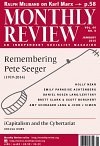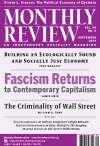History

The publication of socialist books in the United States has always encountered serious institutional obstacles. This can be seen in the enormous hurdles that stood in the way of the successful publication 130 years ago of the English translation of Engels’s The Condition of the Working Class in England (1845)—today recognized as the classic account of the impact of the Industrial Revolution on workers. In 1885 Florence Kelley (-Wischnewetzky), the daughter of William D. Kelley, a U.S. Congressman and supporter of Lincoln, translated Engels’s book into English. Her initial plan was to publish the translation in the United States with the respected publishing firm of G.P. Putnam & Co. However, Putnam declined to publish it on the grounds that the book was outdated…and did not apply to U.S. industrialization, where such conditions of class exploitation were supposedly absent.… It is owing to these difficulties, associated with the U.S. publication of his book, that we have the benefit of some of Engels’s more important comments regarding the problem of publishing socialist works in a capitalist society. | more…
Our friend and comrade Pete Seeger died a year ago this month, on January 27, 2014. Pete was a long-time reader of Monthly Review and, occasionally, a writer for this magazine. Harry Magdoff used to say that when a letter arrived from Pete, nearly always handwritten and often pages long, responding to an article or suggesting a topic to be covered or a book to be reviewed, it would go right home with him, to be pondered, considered, answered, and, especially, enjoyed. Seeger’s communications were never innocuous: he would tell the editors that something MR had published was wrongheaded (or, sometimes, right-headed); he would take an idea, turn it over, and suggest where to go with it. Like his music, Seeger’s letters demanded engagement, participation—and action. He had a special place in the MR family. | more…
Pete Seeger was bigger than life. And like a character in a mythological tale, before long his shoe size will grow to such a degree that he will scale snowy mountains and wade across oceans. He will look over the tops of Redwood trees and when he dips his hand down into the Hudson River, the water up to his elbow, his fingers will reach down to the bottom of the deepest pool and pull up a giraffe and a baby grand and we will forever sing about the magic river.… This mythology will be enjoyed by the living for generations to come. A next generation of troubadours will sing deep into the little faces who, with wide eyes, imagine such a music man. | more…
In the many accolades Pete Seeger received…after his death, there was often something missing—as absent in tributes from admirers who share his revolutionary politics as in those aiming to reclaim him for respectability. That absence is Seeger’s role as an organizer, and, more broadly, the role of music (and other kinds of cultural work) as organizing, which his life exemplifies.… Seeger’s work as an organizer may have been most obvious, its goals most blatant, in the field…. But his work, as a singer, as a song-collector, as a song-teacher, was not any less a labor of organizing in the concert hall. And that’s not exceptional. That…is what makes someone a radical cultural worker. What’s exemplary about Pete Seeger is how damn good at it he was. What we need to pay attention to and learn from is how he did this important work so well. | more…
Remembering Pete Seeger and Camp Woodland
I attended Camp Woodland, a progressive summer camp in upstate New York, for four summers starting in 1955 when I was ten years old. When Pete died last year, it was my fellow Camp Woodlanders that I most wanted to connect with.… Fortunately, a camp reunion in 2012 had revived many old friendships. “Pete’s music was the soundtrack to our lives,” one former camper reminisced on the camp listserv. “Pete modeled our values and transformed how we lived in the world, just like at camp,” another wrote. | more…
In the late 1950s, Pete Seeger received a letter from his manager, Howie Richmond, begging him to write a new hit song. … [Richmond] believed that “protest songs” were not marketable. Seeger was angry—he had a new song in mind, with words from a poem that he had set to music, and he believed it was, in a deep and significant sense, a song of protest.…. The song, of course, was “Turn! Turn! Turn! (To Everything There Is a Season),” which continues to be performed and recorded by many artists, and most famously became a huge folk-rock hit for The Byrds. It was as though, despite himself, Seeger produced a hit song, even when commercial popularity was the furthest thing from his mind—an example of how inseparably his songwriting talents and political principles were bound together. | more…
Getting from Here to There
Pete Seeger is an environmental advocate who understands the transforming power of immersion in nature. However, his desire to restore his cherished Hudson River posed a monumental challenge in the 1960s. The Hudson River, once so majestic that it inspired the Hudson River School painters, had become a sewer for the communities and commercial industries that populated its shoreline. Seeger’s approach to reversing the degradation of the Hudson River involved a unique form of advocacy and organizing. He envisioned healing the Hudson through immersion. His approach involved bringing people back to the river aboard a 106-foot replica of a Hudson River sloop (a single-masted sailboat), one that resembled the boats that traversed the Hudson in centuries past. By 1969, with Seeger as the driving force behind its creation, the sloop Clearwater was constructed and launched. It still sails today and serves as an inspiring symbol of citizen activism on behalf of the natural environment. | more…
The media compelled all of us to follow closely both the Scottish referendum of September 2014 and the conflict between Russia and Ukraine that took on increased momentum starting in spring 2014. We all heard two opposing stories: the unity of Great Britain must be protected in the interest of the English and Scottish people. Moreover, the Scots freely chose, through a democratic vote, to remain in the Union. In contrast, we were told that the independence of Ukraine, freely chosen by the Ukrainian people, is being threatened by the Great Russian expansionist aims of the dictator Putin. Let us look at these facts that were presented to us as incontrovertibly obvious for a good-faith observer. | more…
Cal Winslow, ed., E.P. Thompson and the Making of the New Left: Essays & Polemics (New York: Monthly Review Press, 2014), 333 pages, $23.00, paperback.
It is surely difficult for young people today to grasp that thirty years or so ago, radical historian-activist Edward Thompson was by opinion polls intermittently the second or third most popular person in England, just after the Queen Mother. This was despite the British establishment, to say nothing of U.S. Cold Warriors (liberal or conservative), slandering him for decades—and why not? He had led massive protest movements of ordinary people against their government. Worse, in cloistered academic quarters he was viewed as having reorganized the whole idea of social history and turned it over to ordinary people! More than anyone else in the English-speaking world, he made the history of such people important. | more…

This year is the 150th anniversary of the International Working Men’s Association (IWMA), often referred to as the First International. Formed in 1864 under the leadership of Karl Marx, it operated—in contrast to what were subsequently called the Second, Third, and Fourth Internationals—under the principle of unity with diversity, rejecting a policy of absolute doctrinal unity. After considerable successes, however, it fell prey to sectarian struggles and finally expired in 1876. The 150th anniversary coincides with growing worldwide calls for the construction of a New International. In February 2014, MR published a paper, “Reflections on the New International,” that István Mészáros had drafted in 2010 at the request of Venezuelan President Hugo Chávez. In June 2014, we published Samir Amin’s “Popular Movements Toward Socialism,” addressing the same subject. Both Mészáros and Amin insisted that despite the eventual decline of the IWMA into the factionalism which led to its demise, it—and not the Second, Third, or Fourth Internationals—constituted the model for a New International.… The July 2014 issue of our sister publication Socialism and Democracy, edited by George C. Comninel, Marcello Musto, and Victor Wallis, is devoted entirely to the International’s anniversary, and adopts this same general position. | more…
Bill Ayers, Public Enemy: Confessions of an American Dissident (Boston: Beacon Press, 2013), 240 pages, $24.95, hardcover.
In this beautifully written memoir, Bill Ayers recounts his bizarre and unsettling experience as a “public enemy” during the 2008 presidential election. An unlikely grouping of right-wing web sites, Fox News, liberal foundations, George Stephanopolous, and even university faculty and presidents did their part to portray the then-Distinguished Professor of Education at the University of Illinois, Chicago as a veritable mad man, someone profoundly immoral whom any self-respecting public figure or institution should immediately disavow. This suggests the salience of two phenomena: first, the perennial appeal of demonizing the U.S. left (especially—but not only—its militant wing), and the ready availability of a variety of tropes to do so.… Second, the incidents reveal a dark region of U.S. political culture striving to influence the mainstream. Many Americans were unsettled at the prospect of a black president, and they have displayed their fears, hatreds, and anxieties in various ways ever since. | more…
Betty Medsger, The Burglary: The Discovery of J. Edgar Hoover’s Secret FBI (New York: Alfred A. Knopf, 2014), 544 pages, $29.95, hardcover.
Activists in the anti-war, civil rights, and New Left movements in the 1950s and ’60s were sure they and their organizations were being spied on by J. Edgar Hoover’s FBI. …. But there was little hard proof of a wider strategy to destroy deliberately entire organizations by the use of completely illegal methods. That was soon to change.… In late 1970 [William Davidon] recruited seven other anti-war activists, mostly pacifists, into a secret Citizens Committee to Investigate the FBI. On March 8, 1971, the night of the Mohammed-Ali-Joe Frazier heavyweight match, they broke into the unprotected offices of the FBI in Media, Pennsylvania and made off with all the files, on the assumption that they would find evidence of the FBI’s systematic spying on Americans. They had no idea that what they had in their hands would soon expose much more. | more…

